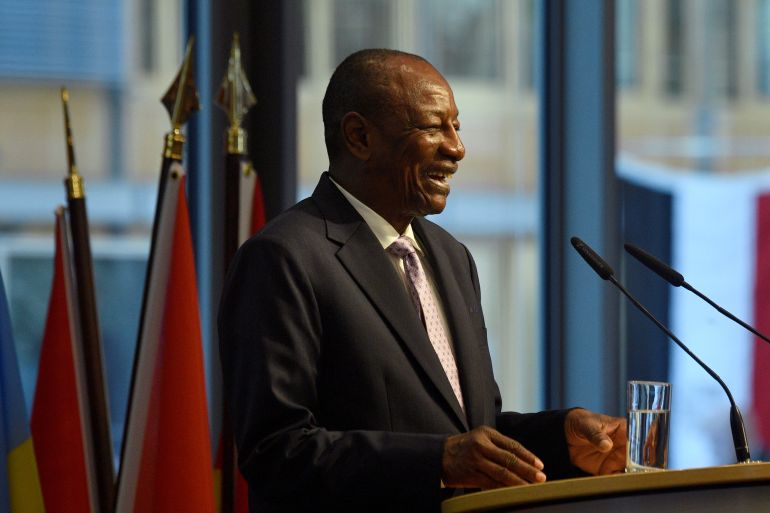Guinea electoral body says Alpha Conde won third term in office
Alpha Conde, 82, won 59.5 percent of the votes cast, according to a preliminary tally from the election commission.

Incumbent Alpha Conde has won Guinea’s disputed presidential election with 59.5 percent of the vote to secure a controversial third term, according to a full preliminary tally from the election commission.
The announcement on Saturday came after days of deadly violence in the wake of the October 18 vote. The opposition says 27 people have been killed, while officials have put the death toll at about 10.
Keep reading
list of 4 itemsGuinea protests: Demands for justice and accountability
Timeline: A year of bloody protests in Guinea
All you need to know about Guinea’s contested polls
The victory, which requires confirmation by the Constitutional Court, gives a third term in office to the 82-year-old after a bitterly fought election in which the opposition said he had no right to participate.
Conde says a constitutional referendum in March reset his two-term limit, but opponents say he is breaking the law by holding on to power.
Results were announced in batches in recent days and already showed Conde with an unassailable lead, sparking street protests in opposition strongholds. On Friday, the internet and international calling were cut off across Guinea.
Opposition candidate Cellou Dalein Diallo, Conde’s nearest rival with 33.5 percent of the vote, said he has evidence of fraud and plans to file a complaint with the Constitutional Court.
Under the law, complaints must be filed within eight days of the preliminary results.
Doubting the independence of the electoral authority, 68-year-old Diallo had on Monday declared himself the winner of the first round of voting before the results were announced, which triggered confrontations between his supporters and security forces.
Protesters took to the streets of the capital, Conakry, again on Saturday, and residents of some suburbs said police officers were firing tear gas canisters to clear them off.
“We’re on the street until Cellou Dalein asks us to come home,” a protester, who declined to be named, told the AFP news agency, referring to the opposition leader.
In 2010, Conde became Guinea’s first democratically elected leader after decades of military rule. He was re-elected in 2015.
Before assuming office, Conde had been a long-standing opposition figure who was jailed and exiled for his views against Guinea’s military government.
Diallo is a former prime minister who also finished runner-up to Conde in the 2010 and 2015 elections.
‘Savage repression’
Speaking from his home in Conakry – where police have barricaded him inside – Diallo told AFP on Saturday that international statements amounted to “rather timid communiques”.
“I am shocked to see also that this savage repression is not denounced and condemned by the international community,” he said.
In a statement, United Nations Secretary-General Antonio Guterres urged Conde and the opposition “to prevail on their supporters to immediately end the violence and engage in meaningful dialogue to find a peaceful solution”.
“The United Nations stands ready to support a dialogue process towards a rapid and peaceful resolution of the crisis,” Guterres said in a statement.
Human Rights Watch (HRW) called on security forces to “exercise restraint” in responding to protests.
“Continued repression risks inflaming an already tense situation and could have disastrous repercussions,” said Ida Sawyer, HRW’s deputy Africa director. “Those responsible for excessive force during protests this week should be held to account.”
@hrw calls on #Guinea security forces to exercise restraint in responding to protests. Continued repression risks inflaming an already tense situation+could have disastrous repercussions. Those responsible for excessive force during protests this week should be held to account 2/ pic.twitter.com/cA0snJKKbR
— Ida Sawyer (@ida_sawyer) October 24, 2020
Akwasi Osei, a professor of history and political science at Delaware State University, said there was still a lot of uncertainty even after the commission’s announcement.
“Nobody really seems to know exactly what’s going on; they cut off the internet, no telephone communication,” he told Al Jazeera, but said it was “good news” that representatives from the Economic Community of West African States (ECOWAS) regional bloc and the UN were “on the ground”.
Looking ahead, Osei said he suspected Conde “is going to stay for a bit, and there will be some agreements”.
He added: “There have to be some agreements because the alternative, which is the violence that is going on, cannot be sustained.”
Monitors from the African Union and the 15-nation ECOWAS, of which Guinea is a membee, said earlier this week election was mostly fair.
Conde’s decision to run for a third term sparked repeated protests over the past year which were met with a harsh crackdown by security forces, leaving dozens of people dead.
The government has denied using heavy-handed tactics against the protesters and accused the opposition of causing chaos.